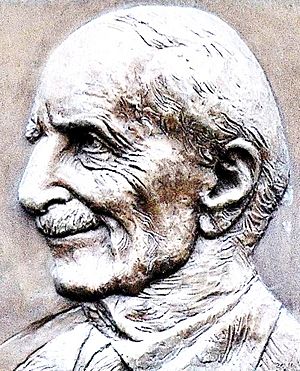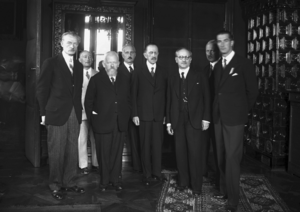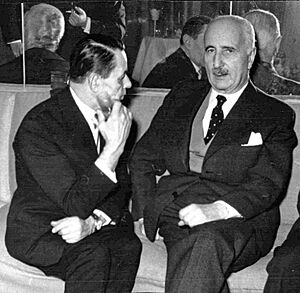Władysław Tatarkiewicz facts for kids
Quick facts for kids
Władysław Tatarkiewicz
|
|
|---|---|

Detail, plaque on Tatarkiewicz's 1960–1980 Warsaw apartment building
|
|
| Born | April 3, 1886 Warsaw, Congress Poland, Russian Empire
|
| Died | April 4, 1980 (aged 94) Warsaw, Polish People's Republic
|
| Alma mater | Warsaw University of Technology University of Warsaw |
| Era | 20th-century philosophy |
| Region | Western philosophy |
| School | Lwów–Warsaw school of logic |
|
Main interests
|
aesthetics, ethics, history of art, history of philosophy |
Władysław Tatarkiewicz (Polish: [vwaˈdɨswaf tatarˈkʲevitʂ]) was a famous Polish thinker. He was born in Warsaw on April 3, 1886. He passed away in Warsaw on April 4, 1980, at 94 years old. He studied many subjects. These included philosophy, art history, and ethics. He was known for his ideas about beauty and happiness.
Contents
Early Life and Learning
Władysław started college at Warsaw University. In 1905, the Russian authorities closed the university. This meant he had to go abroad to study. He continued his education in Marburg, Germany. He studied there from 1907 to 1910.
Teaching Career and Wartime Bravery
Tatarkiewicz began his teaching career in Warsaw. This was during World War I. He taught philosophy at a girls' school.
In 1915, the Polish University of Warsaw reopened. This happened under German sponsorship. Tatarkiewicz became the head of its philosophy department. He led it until 1919.
Later, he taught at other universities.
- From 1919 to 1921, he was a professor at Stefan Batory University.
- From 1921 to 1923, he taught at the University of Poznań.
- From 1923 to 1961, he returned to the University of Warsaw.
In 1930, he became a member of the Polish Academy of Sciences.
Teaching During World War II
During World War II, Tatarkiewicz showed great courage. He gave secret lectures in German-occupied Warsaw. This was very dangerous. One of his students was the famous writer Czesław Miłosz.
After the Warsaw Uprising in 1944, he risked his life again. He saved a manuscript from the street. A German soldier had thrown it there. This work was later published as a book. Its English title is Analysis of Happiness.
Later Career and Retirement
After World War II, he continued teaching at the University of Warsaw. In 1950, he faced a difficult time. Some of his former students criticized his teaching. They said he focused too much on "objective science." They wanted him to teach more about Marxist ideas. Because of this, he was removed from his teaching position.
Tatarkiewicz saw this as a good thing. It gave him more freedom. He could focus on his research and writing. He believed that being a retired professor was a good life. He could work on what he wanted. He also had time to enjoy walks in the park. He felt he no longer had rivals or enemies. This made life much more peaceful.
Tatarkiewicz's Ideas on Happiness
Władysław Tatarkiewicz thought deeply about happiness. He believed that true happiness is more than just being happy about small things. He said, "satisfaction with particular things... is only partial satisfaction." For him, real happiness meant being happy with your whole life.
Major Works and Influence
Tatarkiewicz was part of the Lwów–Warsaw school of logic. This group of thinkers was very important in Poland. They produced many great scholars. These included philosophers, logicians, and psychologists.
Tatarkiewicz taught many generations of Polish students. He influenced philosophers, art historians, and many other people. His books, like his History of Philosophy, continue to teach people today.
In his later years, he worked to get his books translated. He wanted his ideas to reach more people.
Here are some of his important works:
- History of Philosophy (three volumes)
- History of Aesthetics (three volumes)
- Analysis of Happiness (also known as On Happiness)
- Łazienki warszawskie (about the aesthetics of Warsaw's Royal Baths Park)
- A History of Six [aesthetic] Ideas
- Parerga (a collection of essays on topics like beauty, poetry, and value)
- On Perfection
See also
 In Spanish: Władysław Tatarkiewicz para niños
In Spanish: Władysław Tatarkiewicz para niños
- History of philosophy in Poland
- History of the concept of creativity
- List of Poles
- Perfection
 | Ernest Everett Just |
 | Mary Jackson |
 | Emmett Chappelle |
 | Marie Maynard Daly |



